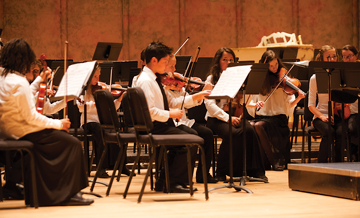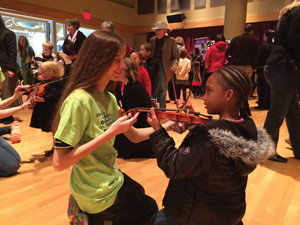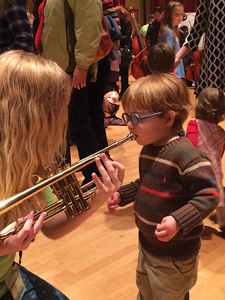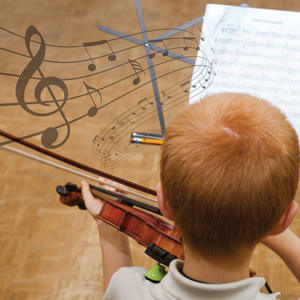“Hey, Diddle Diddle” was Emma Chun’s favorite nursery rhyme. She liked cats, and early on, Emma thought she should have a fiddle, too. She got her first one at age three.
And though Emma, now an eighth grader at St. Bridget School, has outgrown nursery rhymes, she still likes cats – and fiddles. She’s a violinist in the Richmond Symphony Youth Orchestra. The experience is a huge part of her life, she says.
The Richmond Symphony plays an important role in nurturing a love of music for countless children and families in Central Virginia.
In an age of budget cuts for arts in the schools, it offers a chance to listen and to learn. But at its heart, it’s much more.
“We’re about really helping people connect to music, helping to make music an important part of this community and being a pillar of what a strong community is,” says Aimee Halbruner, director of education and community engagement with the Symphony.
For more than fifty years, the Symphony has offered youth music programs, giving families a place to learn, to perform, to listen, and to grow. Many parents who grew up in Richmond recall school field trips to hear the orchestras – and for many, it made a lasting impression that they’ve passed along to their own children.
“The Symphony is a major part of what we do,” said Doug Brown, a father of six who has three children participating in youth ensemble programs and two more just about ready to join. “I played in the Richmond Symphony Youth Orchestra as a kid, and it was an important part of my upbringing.”
Daughters Anita, Miriam, and Celedonia have benefitted greatly from the experience, Brown said. “Playing in an orchestra is like nothing else in the world.”
Brown believes that his children have grown tremendously because of their involvement, and Steven Smith, the Symphony’s music director, has an idea why that’s the case.
“Our world is filled with technologies and debates that divide us. The arts bring us together. It is of the greatest importance that young children – indeed, children of all ages – have the opportunity to hear and feel the thrilling music that orchestras perform,” he said. And, of course, many get to perform themselves.
It takes commitment. It takes discipline. But, say many area youth, the chance to play is worth every minute spent in the practice room.
“When you’re sitting on stage,” explains Yixuan Zhao, a tenth grader at Collegiate School who plays flute with the Symphony’s Youth Orchestra. “It feels like everything else is not real. It’s an incredible feeling.
“In our first concert, we played Stravinsky’s ‘Rite of Spring,’ which is very difficult. And so when I was playing it, I was completely focused, and I felt like I was hearing orchestra and my part, but everything else was out of my mind. When I finished, it felt overwhelming.”
The music can be difficult, said Yixuan (pronounced e-shoo-ann), but that’s the point. “It’s like focus and relaxation at the same time. My mind is completely concentrated on the music when I’m playing it. I don’t get that from other things.”
 Love of Learning
Love of Learning
Yixuan and her mother, Mei Zhang, believe studying music has helped her excel in academics. “Actually, knowing how to practice helps me study better and be more focused as a person in general,” said Yixuan.
There’s a lot of research that agrees.
• Students involved in music programs have
higher attendance and graduation rates.
• Students score higher on standardized tests, regardless of socioeconomic level of the school or school district, when they’re exposed to and involved in a music program.
• Students, who have fallen behind academically and are given musical instruction over seven months, catch up to their fellow students and then surpass their classmates in math by 22 percent.
In addition to aiding focus and concentration, Halbruner notes that learning to read and play music has measurable results because of its symbol system. “When you learn to decode music, I think other abstract things start to make different sense in your brain. I’ve heard from a lot of students that things like geometry and spatial reasoning make sense in a different way.”
Keeping young brains challenged is important, but another of music’s greatest gifts, says Halbruner, is its ability to unite families in its enjoyment. And the Symphony has programs to support children of all ages.
They can start early, with the Symphony’s Music Together classes for infants, toddlers, and preschoolers, she said. “It’s all about the family coming together. They can play instruments, sing songs, learn to match pitch, and celebrate being together.”
Halbruner thinks this is a great start to creating lifelong music lovers. And who knows where that will lead?
Love of Playing
“My parents listened to music at home and took me to concerts, plus, I had the chance to begin studying music in my public grade school. Certainly, without that experience as a child, it seems unlikely I would have ended up where I am today,” said Maestro Smith, who served as music director of the Cleveland Youth Orchestra and championed arts education before coming to Richmond.
 How do you know when it’s time to start your child playing a real instrument?
How do you know when it’s time to start your child playing a real instrument?
There’s no right or wrong age to begin, says Halbruner, who began piano lessons at age four. “Music made sense to me and the piano made sense to me very early,” she said. “If music makes sense to a child and they can already do it, there’s no reason not to do it.”
First grade is another popular time to begin, since children can sit still longer and read basic method books. “Also, I’ve had a lot of students who start in the third grade who just take off, because there’s something about the third-grade brain that helps it all fall into place. They move really fast and learn right away [at this age] so that they are super geniuses and they can do amazing stuff.”
That said, she noted, she’s had students excel at a variety of ages.
Jami Hagood, who graduated from Cosby High School in 2015 and now attends Virginia Commonwealth University, discovered the trumpet in third grade. “It was really shiny,” she recalls with a laugh. She began with the trumpet, then piano, trombone, and eventually took up the tuba, which she played for several years in the Richmond Symphony’s Youth Concert Orchestra.
“I love the tuba. It’s shiny and it’s beautiful. I love the deep rich sound it makes, and I love how I can speak with my tuba and how it speaks for me.”
Music is a way of life for Hagood’s family, who made it a priority for her to learn an instrument, she said. “I got into music pretty early in my life because almost all of my family members play music and that’s what we do at family gatherings. We’d all get together and play, and I wanted to be a
part of that.”
Hagood credits the Symphony’s Youth Orchestra Programs, collectively referred to as YOP, for giving her direction and creating a supportive environment.
The programs draw more than 250 area students annually to programs including:
String Sinfonietta An entry-level orchestra that doesn’t require an audition. Though students need basic music skills, there are a wide range of students, ages, and abilities. It’s a place to find where you fit, to learn to play in orchestra, and learn to follow a conductor.
Camerata Strings Requires an audition. This intermediate-level group works on dynamics and phrasing, with an increasingly difficult repertoire. There is advanced thinking about playing music in an ensemble.
Youth Concert Orchestra A new experience for many students, drawing many who have participated in band, but not a full orchestra with a string section. It’s known for being challenging, but fun.
Richmond Symphony Youth Orchestra Known as RSYO, this advanced full-level orchestra is for serious players. At least once a year, this orchestra plays alongside the Richmond Symphony.
 Emma Chun was astonished to earn a spot in RSYO while still in middle school. She has appreciated the challenge, and said she’s gotten a lot out of the experience. “You have to work as part of a team with people in your section and the whole orchestra. Also, there are chances for leadership.”
Emma Chun was astonished to earn a spot in RSYO while still in middle school. She has appreciated the challenge, and said she’s gotten a lot out of the experience. “You have to work as part of a team with people in your section and the whole orchestra. Also, there are chances for leadership.”
Anita Brown, a ninth-grade violist in the Youth Concert Orchestra, said she feels good when she rises to the challenge of mastering new works. “We play together and help each other with the notes.”
There are many opportunities for older students, including Orchestra Project, a partnership with VCU. The summer camp for string musicians in grades five through twelve includes study with VCU professors and musicians from the Richmond Symphony. The Richmond Symphony Orchestra League hosts an annual concerto contest to recognize talented young musicians from Virginia. The winner is invited to perform in concert with the Symphony.
Love of Listening
Not all students (or their families) can make the commitment to lessons and rehearsals, but the Symphony is committed to reaching them where they are with numerous concerts in schools, aid Halbruner. For many area students, it’s a first exposure to chamber or orchestral music. Some of the offerings include:
• The Elizabeth G. Schneider Discovery Concerts by the Richmond Symphony correlate with Virginia SOLs.
• Chamber ensembles of the Richmond Symphony perform more than one hundred concerts annually for upwards of 30,000 school children in Chesterfield, Goochland, Hanover, Henrico, Powhatan, New Kent, and Richmond public schools, as well as independent and home schools.
• Symphony@School (S@S) is an intensive, in-school residency program offered by the Richmond Symphony String Quintet to middle and high school orchestra programs.
These concerts for students are designed to spark a desire to hear more. That’s why the Symphony front office makes it as easy as possible for families with children to attend concerts.
The Symphony presents the Union First Market Bank Lollipops series each year on Saturday mornings. Concerts start with a musical petting zoo where children can hold and learn about instruments. There also are activities before the show. Family shows are designed to ignite young imaginations with concerts such as the Halloween Spooktacular where kids come in costume and listen to music from Frozen, Star Wars, and Harry Potter; the Symphony accompaniment to the animated film, The Snowman; and the award-winning Video Games Live and Green Eggs and Ham, both slated for January of next year.
Performances by the Youth Orchestra Programs are always popular for families and offer children a chance to see their peers perform.
And, of course, children are welcome at any of the Richmond Symphony’s regular concert series. Halbruner started her son, Max, attending shows from an early age. “When Max started to go to concerts with us, he always brought a book. Maybe he would read almost through the whole concert, but he still would be taking it in. When he got older, he would listen to one movement, shut the book, then it got to one piece, then one half, then he got older and doesn’t bring the books anymore.”
Halbruner tells parents, “If you’re going to the symphony, don’t feel like you have to leave the kids at home,” noting that children’s tickets are free with adult purchase.
Not all the concerts take place in what might be perceived as a stuffy concert hall. The Symphony performs outdoors at various venues and recently purchased a huge tent to expand outdoor opportunities. It even has a concert series at Hardywood Park Craft Brewery.
All this is part of the mission to present as much music to as many audiences as possible. “An organization like ours is much like a museum,” says Halbruner. “We’re the keeper of great art that has been created across the globe all through the years. And we’re the people who get to present that. Everybody should be a part of this continuum.”
Love of Community
Ask area musicians their favorite annual event, and you might hear about Come & Play. Each year, musicians of all ages and levels of ability come together at VCU’s Siegel Center and play alongside the musicians of the Richmond Symphony.
For a young player, the chance to sit next to professionals is inspiring and the casual atmosphere neutralizes some of the intimidation. The event draws about 600 players each year.
Experiences like that reinforce a love of music and performing. They also inspire a new generation of music teachers, including 18-year old Jami Hagood of Chesterfield County, to want to share it.
“I would like to be a middle school band director. It was in middle school when I really started to understand music and feel the joy of playing and the benefit of practicing. My middle school band director really influenced me, and later, so did other band and Symphony leaders. I want every kid to have the same experience, the same opportunities, and the same benefits I had.”




